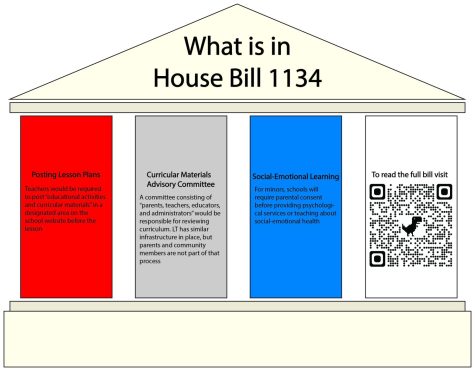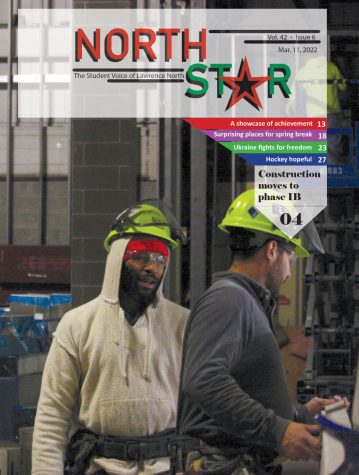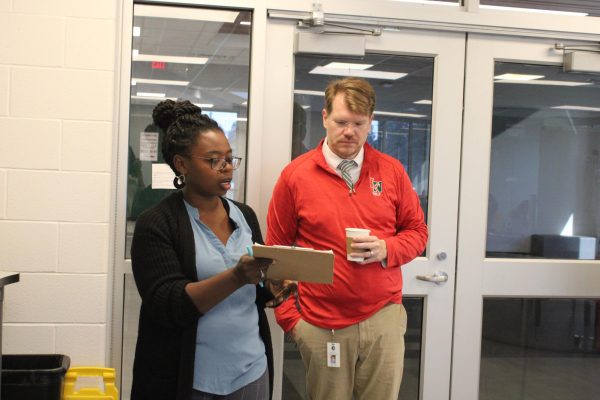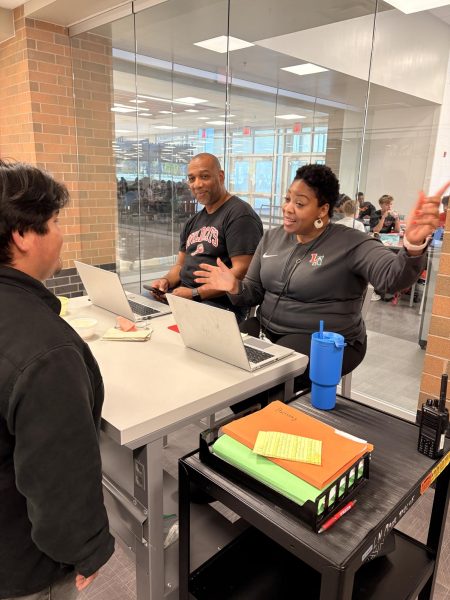A critical change
How Indiana House Bill 1134 could affect LN and the community as a whole
A controversial education bill, Indiana House Bill 1134 is up for consideration by the Indiana House of Representatives. Many see this bill as a response to the backlash some school districts have gotten for how they teach certain sensitive topics.
“If I were to explain House Bill 1134 to someone who’s never heard of it, I would explain it as a bill that has been brought forth due to isolated incidents in certain areas. I would further explain that some of the items in that bill don’t pertain to everyone statewide,” Justin Brown, President of Lawrence Education Association and teacher at Winding Ridge Elementary School, said.
House Bill 1134, authored by State Representative Anthony Cook, was introduced after a similar bill stalled in the Senate. One of the main purposes of the bill is to limit how certain subjects related to race and other sensitive topics can be talked about in schools.
“I think it could be challenging for a community as diverse as ours. If we didn’t teach history, it could come across as very offensive for some people, especially with the diversity that we have,” Dr. Shawn Smith, Superintendent of Lawrence Township schools, said.
Part of the bill aims to include parents more in the educational process. One major way that the bill plans to do this is by creating a “curricular materials advisory committee,” in which parents would have increased say in curriculum, and how subjects are taught in schools.
“I think it is super important to have parents involved in the learning process, but there are other ways parents can get involved through parent-teacher organizations,” Brown said.
In Lawrence Township, curriculum is reviewed in a process called “Program Evaluation” at several levels before making its way to its students. Superintendent Dr. Shawn Smith has experience with this process, but is unsure how this new proposed law would change current policy.
“When an education bill passes, it can sometimes be difficult to understand what the repercussions are until a somewhat lengthy process occurs. The state education department, school board, and teachers have to interpret what a law would mean, and how it would be different from any current policy,” Smith said.
One requirement for teachers under House Bill 1134 would be to post educational activities and resources on the school website prior to instruction. The aim is to increase transparency and student involvement, but many see this as an unnecessary burden for teachers, giving them more work and less ability to be creative.
“If teachers don’t have the flexibility and creativity to use their art and skill, and we are going to handcuff them and tell them how they teach, that’s a problem,” Smith said.
Another aim of House Bill 1134 is to limit, or at least significantly alter, the way in which divisive topics are taught. Some question the principle behind this, and argue that teaching divisive topics are essential to a student’s educational success.
“Government and politics can’t be taught without discussing government and politics. That necessarily includes topics that can be divisive,” government teacher Anthony Rufatto said.
In a district and community that prides itself on promoting and teaching diversity and inclusion, some may see this particular philosophy as counterproductive.
“We are such an inclusive community and accepting of one another that we don’t have to fight one another over these types of issues,” Smith said.
The debate about whether or not talking about divisive and sensitive topics is an important part of one’s education or harmful remains.
One requirement of House Bill 1134 is that alternate assignments must be provided for parents and students when they choose to “opt out” of activities that make them feel uncomfortable. Lawrence Township already has this policy, and has a system set in place for when students want alternate assignments.
“We do have a policy, and we do allow for youngsters to opt out. I have dealt with personally, as superintendent, situations where people can opt out if they don’t feel comfortable with that. And so, we have had that for many many years, and so there isn’t this, you know, where parents don’t have any input or say. If you feel uncomfortable, just let us know about it,” Smith said.[
“It’s not about making people feel bad, that’s not what teaching is about. It’s about making you young people become critical thinkers, and being able to analyze things based on your ability,” Smith said.
One other part of House Bill 1134 that has caught attention are the restrictions that it puts upon teaching social-emotional learning, and dealing with the psychological problems that many in our school systems face.
“Teachers are more than teachers. Many of them are mentors. They are highly respected in the community, they are lifesavers for youngsters, and you’re telling a teacher they can’t support kids’ social and emotional well-being, I don’t know how we operate,” Smith said.
Specifically, House Bill 1134 would require schools to obtain written consent from parents or guardians “before a school corporation or qualified school may provide or administer certain mental, social-emotional, or psychological services to a student,” drawing questions about the possible ramifications of this section.
“No law will change the level of concern I have for my students. If there’s a specific policy change that redefines formal steps I can or can’t take, the district will set that, and I’ll follow it. If they outlaw me checking in on kids who are visibly upset, I have no problem being an outlaw,” Rufatto said.
Many believe that current politics should not influence school policy. The manner and circumstances of which House Bill 1134 has written has made many believe that this is more of a political bill than anything else.
“I think making it very political, either one one side or the other, could turn a lot of people off. We’re already experiencing that. Teachers have always been neutral in their approach anyway, and politicizing is very dangerous,” Smith said.
Both the supporters and critics of House Bill 1134 want to create or maintain a learning environment that is best suited for learning and growing.
“I feel like if this bill were to pass, it would hinder our ability to create that safe space for students to develop their own thoughts and opinions,” Brown said.
Indiana is already facing a desperate teacher shortage, with a survey by Indiana State University finding that 96% of school districts in Indiana report teacher shortages. Many fear that these extra restrictions could exacerbate the issue, causing teachers to abandon the profession or less likely to join it.
“If this bill passes education in the state of Indiana as we know it will change because you are going to lose a lot of teachers. It’s not going to affect many people’s day to day life because they’re just going to walk, and that’s already happening,” Brown said.













